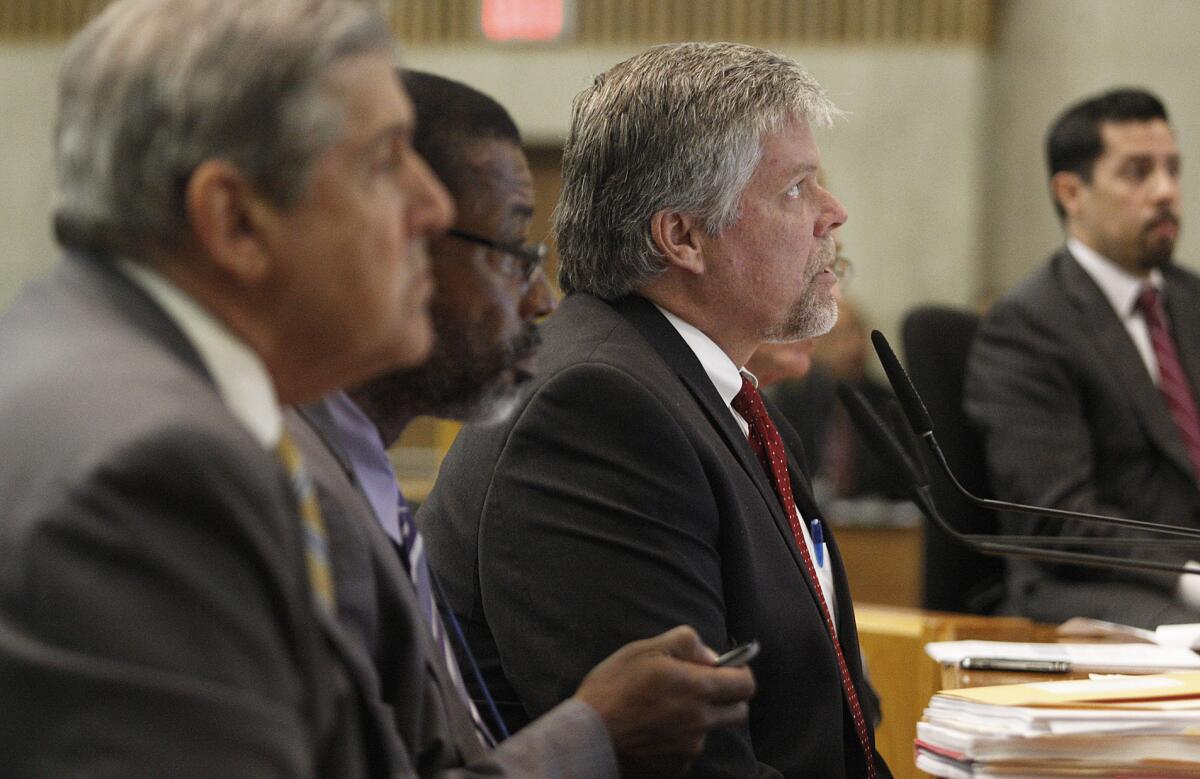Federal monitoring of L.A. County juvenile probation camps ending

Jerry Powers, center, chief probation officer for Los Angeles County, addresses the Los Angeles County Board of Supervisors in 2013. The probation department recently emerged from six years of federal monitoring of its juvenile camps.
- Share via
Federal officials have ended six years of special oversight of Los Angeles County’s juvenile probation camps, saying local officials have implemented required reforms to improve conditions and prevent abuse of young offenders.
In a report released to The Times on Friday, a team of monitors overseeing a settlement agreement between the county and U.S. Department of Justice wrote that “full compliance” has been achieved and the department is “no longer subject to monitoring.”
The Justice Department began investigating conditions in the county’s 19 probation camps in 2006, after repeated reports of abuses. Two years later, the county agreed to a settlement outlining a series of reforms that included measures to prevent mistreatment of minors and misconduct by probation officers, as well as ensure camps were adequately staffed.
Later, conditions were added requiring expanded programs to keep teens from entering juvenile lockups.
The monitoring was supposed to end in 2012 but was extended two years when the department fell short on reforms.
Probation Chief Jerry Powers, who took over the department in late 2011, said when he arrived, the agency was “teetering on the brink of a takeover.”
“When I got here, we weren’t even treading water on it,” he said. “We were losing ground in a lot of areas.”
To have turned the camps around to the point that the federal monitoring can end is “a huge accomplishment,” he said.
The monitoring team found that the county made changes to prevent excessive use of force, including overuse of pepper spray by staff, and prevent misconduct such as drinking on the job. Other measures were implemented to reduce youth-on-youth violence, prevent suicide and help young inmates transition back into society.
The number of youths in juvenile halls and camps has decreased substantially over the last few years. But the federal monitors still said the county should explore policies allowing more low- and medium-risk juvenile offenders to be cited and released, rather than locked up until their court dates.
In many cases, including minors arrested on warrants, the department is required to hold them. But in other instances probation staff have greater discretion over whether to detain youths.
The monitors noted that the lower-risk teens who were released while awaiting court hearings generally “performed well in the community, with relatively low rates of recidivism.”
Michael Graham, a former L.A. County assistant sheriff who headed the monitoring team, commended county officials for their efforts to “change attitudes that had been in place for a very long time.”
“They’re no longer at a point that would be considered to be below a constitutional standard,” he said.
Graham said the department should continue efforts to reduce the number of children in the lockups, focus on upgrading aging facilities and consider implementing ongoing independent monitoring of its operations.
Supervisor Michael D. Antonovich praised Powers’ leadership in a statement and said, “This is an outstanding achievement for all of the county departments involved, including the probation department, department of health services and mental health.”
Two of his colleagues were more circumspect.
“We appreciate the significant changes that have been made in the camps over the last several years,” Supervisor Hilda Solis said in a statement. “But we are a long way from camps that are rehabilitative rather than punitive.”
Solis said she was looking “very closely” at policies governing solitary confinement and family visits and at ways to expand workforce training for the youths held in camps.
Supervisor Mark Ridley-Thomas said there were other department issues the Justice Department monitoring did not focus on, including fiscal and personnel issues, the “quality of the experience the youngsters are having” and the rate at which they re-offend.
“It’s a big department, with a lot of issues to be addressed,” he said. “The memorandum of agreement was not designed to address all of those issues.”
Felicia Cotton, the deputy probation chief in charge of the juvenile lockups, said the department will continue to be reviewed by the county auditor-controller and may add another outside oversight body.
“I think we have made some great inroads” in changing the culture of the camps, she said. “I don’t want to make it appear that we have arrived, but we have made some major strides.”
Follow Abby Sewell on Twitter at @sewella for more county news.
More to Read
Sign up for Essential California
The most important California stories and recommendations in your inbox every morning.
You may occasionally receive promotional content from the Los Angeles Times.











